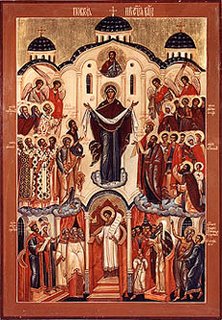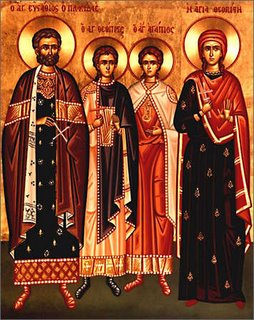St. Theodore Ushakov, Oct 2/15
St. Theodore Ushakov was one of the greatest Russian naval commanders of the 18th and 19th centuries. Despite his impressive record, the unpopularity of his naval reforms forced him to retire in 1807. He settled near the Sanaxar monastery. He often attended services there and spent Great Lent at the monastery. He was a generous man, donating money to help the monastery as well as helping the poor in the area. He died in 1817 and was buried at Sanaxar monastery. He was canonized in 1994.
Sources: St. Theodore
Thursday, October 26, 2006
Grey Days
So....anyone guess the hidden meaning for the last poem? If you really want to know, leave a comment and I'll tell you.
Grey Days
These grey days have a loveliness
Of their own entirely.
A time for rest; a time for life to
Pause and hearts to breathe.
These quiet shades of grey and white
Are not the sun, its true.
Yet they cover the old earth with a cloak
Before the world turns new.
Grey Days
These grey days have a loveliness
Of their own entirely.
A time for rest; a time for life to
Pause and hearts to breathe.
These quiet shades of grey and white
Are not the sun, its true.
Yet they cover the old earth with a cloak
Before the world turns new.
Saturday, October 14, 2006
Dancing
Here's a poem I wrote a few years ago. There's a double meaning to the poem--see if you can figure it out. I'll tell you what it is next time I post.
Dancing
When the trees all are bare,
And the winter of the world is dun
And there is a grey chill in the grey air
And the earth is hard and stone,
Then come to the woods that will never die,
To the space deep in the heart,
Warm below the grey chill sky--
That ever enchanted elven glade.
There we see the elven people, people of the light;
Tall they are and kind and fair,
They brighten the dark night--
Their flying feet across the moss and flying shining hair.
Then watch them flitting to and fro;
Dancing in the graceful glade
Until the air comes all a-glow
And fills with the light of their robes and their hair.
Steal softly, steal away,
Back into the dun winter world.
And though the air and sky are grey,
Your heart is in the elven glade.
Dancing
When the trees all are bare,
And the winter of the world is dun
And there is a grey chill in the grey air
And the earth is hard and stone,
Then come to the woods that will never die,
To the space deep in the heart,
Warm below the grey chill sky--
That ever enchanted elven glade.
There we see the elven people, people of the light;
Tall they are and kind and fair,
They brighten the dark night--
Their flying feet across the moss and flying shining hair.
Then watch them flitting to and fro;
Dancing in the graceful glade
Until the air comes all a-glow
And fills with the light of their robes and their hair.
Steal softly, steal away,
Back into the dun winter world.
And though the air and sky are grey,
Your heart is in the elven glade.
Tuesday, October 10, 2006
Betsy
This is just a short snippet of a character sketch that I did some years ago. I personally enjoy Betsy.
Betsy Malo was evidently what Susie would have called 'countrified.' She wore a straw bonnet on top of her gold hair, green eyes, and a snub nose. She wore a green and blue striped dress obviously washed and mended many times and a red and white checked shawl which contrasted oddly with the dress. She carried a somewhat dilapidated basket with a white napkin carefully covering the top.
Betsy Malo was evidently what Susie would have called 'countrified.' She wore a straw bonnet on top of her gold hair, green eyes, and a snub nose. She wore a green and blue striped dress obviously washed and mended many times and a red and white checked shawl which contrasted oddly with the dress. She carried a somewhat dilapidated basket with a white napkin carefully covering the top.
The Protection of the Theotokos

I apologize for not posting this on time.
The Protection of the Theotokos--1/14 Oct
Around 936 A.D. a vigil was being held in the Church of Blachernae, Constantinople. A group of people saw the Mother of God, St. John the Baptist, and several other saints in the church. The Theotokos went to the center of the church where she knelt and prayed with tears. She then removed her veil and held it over the people. This was taken as a sign of protection and indeed the city was spared several times.
Source: Orthodox Wiki
Wednesday, October 04, 2006
Poem
Time for a new poem!
Untitled
I saw a girl was sitting there
And her face was sad and her face was fair.
The unheeded tears streamed down her cheek
And she did sigh and would not speak.
The silent girl just there did sit
And her sad fair face was brightly sunlit.
Why she was crying I do not know;
What the cause of her private woe.
I shall never see her evermore,
Yet I know if I should I'd her adore
And the memory of those quiet tears
Will never fade through all the years.
October 29, 2004
Untitled
I saw a girl was sitting there
And her face was sad and her face was fair.
The unheeded tears streamed down her cheek
And she did sigh and would not speak.
The silent girl just there did sit
And her sad fair face was brightly sunlit.
Why she was crying I do not know;
What the cause of her private woe.
I shall never see her evermore,
Yet I know if I should I'd her adore
And the memory of those quiet tears
Will never fade through all the years.
October 29, 2004
Monday, October 02, 2006
St. Eustathius and his family
St. Eustathius Placidus, St. Theopiste, St. Agapius, and St. Theopistus Sept. 20/Oct. 3
St. Eustathius (Eustace) was a famous early Roman general. He was married and had two sons. One day he was out hunting when he saw a stag in the distance. He chased it for a long time and finally caught up with it only to see a cross glowing between the stags antlers. After this he and his family became Christians. They left Rome but along the way all three were separated. Eustathius's wife was captured by pirates and his two sons were stolen by wild animals. Eustathius mourned them as dead.
Eventually the emperor discovered him and as he was in the midst of a war called on his old general to help him. Eustathius agreed. While in his army two young men met and discovered that they were Eustathius's long lost sons although they did not know who he was or that he was their commander. Eventually they all discovered each other but Eustathius and his sons still believed his wife to be dead. One day Eustathius had occasion to go into the garden of the house next to them where he met a woman about his age. She recognized her husband by one of his scars and the family was finally reunited.
Eustathius won the victory for Rome and he and his family departed in triumph for the capital. During the victory celebrations they were required to sacrifice to the idols and refused. The emperor was very angry and ordered them to be fed to lions. These animals refused to eat the saints which only enraged the emperor further. He ordered a metal bull made and heated it until it was red hot. Then he threw the holy family into it.
Holy saints, pray to God for us!

Image from http://www.byzantines.net/byzcathculture/icons/steustacewifesons.jpg
St. Eustathius (Eustace) was a famous early Roman general. He was married and had two sons. One day he was out hunting when he saw a stag in the distance. He chased it for a long time and finally caught up with it only to see a cross glowing between the stags antlers. After this he and his family became Christians. They left Rome but along the way all three were separated. Eustathius's wife was captured by pirates and his two sons were stolen by wild animals. Eustathius mourned them as dead.
Eventually the emperor discovered him and as he was in the midst of a war called on his old general to help him. Eustathius agreed. While in his army two young men met and discovered that they were Eustathius's long lost sons although they did not know who he was or that he was their commander. Eventually they all discovered each other but Eustathius and his sons still believed his wife to be dead. One day Eustathius had occasion to go into the garden of the house next to them where he met a woman about his age. She recognized her husband by one of his scars and the family was finally reunited.
Eustathius won the victory for Rome and he and his family departed in triumph for the capital. During the victory celebrations they were required to sacrifice to the idols and refused. The emperor was very angry and ordered them to be fed to lions. These animals refused to eat the saints which only enraged the emperor further. He ordered a metal bull made and heated it until it was red hot. Then he threw the holy family into it.
Holy saints, pray to God for us!

Image from http://www.byzantines.net/byzcathculture/icons/steustacewifesons.jpg
Sunday, October 01, 2006
October's quote
Time for the next quote of the month!
October's Quote of the Month
“A sensible man will remember that the eyes may be confused in two ways—by a change from light to darkness or from darkness to light; and he will recognize that the same thing happens to the soul.”
~Plato
October's Quote of the Month
“A sensible man will remember that the eyes may be confused in two ways—by a change from light to darkness or from darkness to light; and he will recognize that the same thing happens to the soul.”
~Plato
Subscribe to:
Comments (Atom)

